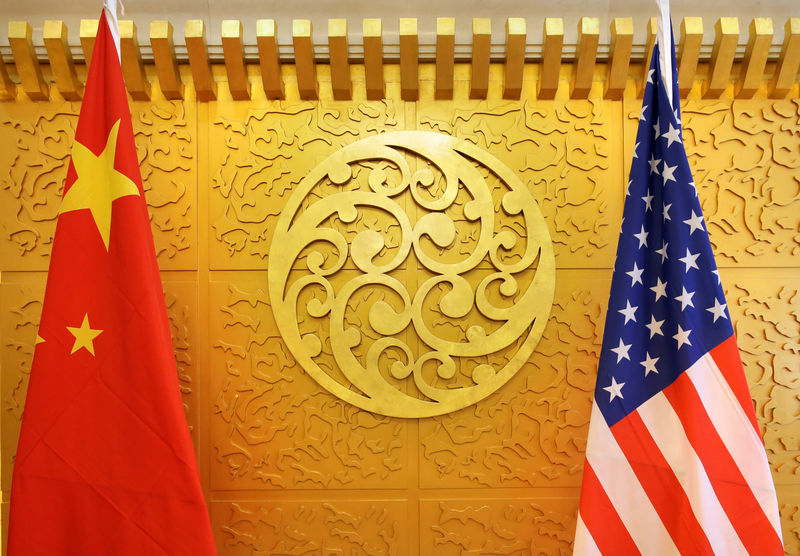Investing.com -- Here are the top 5 things you need to know in financial markets on Monday, May 13.
1. Trade War Escalates
President Donald Trump raised the stakes in the U.S.’s trade dispute with China, instructing Trade Representative Robert Lighthizer to prepare 25% tariffs on all U.S. imports from China not yet covered by existing measures.
The move comes after the imposition of tariffs on $200 billion worth of Chinese imports on Friday. China has vowed to retaliate but has not announced any specific measures yet.
Despite everything, Trump’s top economic advisor Larry Kudlow said at the weekend that the President would aim to meet with Xi Jinping at a G-20 meeting in June. China has invited U.S. negotiators to Beijing to continue talks this week.
If Washington slaps tariffs on more goods, as it threatens to, U.S. consumers will feel the impact on their wallets more clearly,” said Deutsche Bank strategist Ulrich Stephan. “For products such as smartphones or laptops, there are few alternatives to Chinese providers in the world economy.”
2. Wall Street Set to Open Sharply Lower
Wall Street is set to open sharply lower due to the escalation of the trade conflict. At 5:45 M ET (0845 GNT), the Dow futures contract was indicated down 300 points, or 1.2%, while the S&P 500 futures was down 35 points or 1.2% and the Nasdaq 100 futures was down 1.6%, or 123 points.
The escalation of the trade dispute has sent a chill through stock markets everywhere. China’s Shanghai Composite lost 1.2%, while the Euro Stoxx 50 was down 0.5%, amid fears that Europe’s automakers could be the next to suffer U.S. tariffs.
The overall conditions will make it harder for newly-listed Uber (NYSE:UBER) to stabilize after falling 7.6% on its debut on Friday. It’s indicated to open at $40.55, down another 2.5%.
Read More: 3 Stocks To Watch In The Coming Week: Tilray, Nvidia, Pinterest (NYSE:PINS) - Haris Anwar
3. Dollar Surges vs EM FX
Foreign exchange markets have also reacted sharply to the news, with China’s yuan falling to a four-month low against the dollar on the news. India’s rupee hit a two-month low overnight, while the Aussie dollar, a proxy for Chinese growth and global risk appetite in general, is meanwhile heading back toward the 10-year low against the dollar that it hit earlier this month.
A rise in the dollar against emerging currencies is one of the main channels through which the trade conflict hits global growth, by making it harder for emerging markets to buy imports and service their dollar-denominated debts.
With that in mind, bets have started to rise again on the Federal Reserve cutting interest rates later this year. The two-year U.S. Treasury yield has now fallen to 2.22%, some 20 basis points below the targeted Fed Funds rate.
4. Oil surges after "sabotage" attacks on Saudi tankers
Crude oil prices have risen sharply overnight in response to attacks on two Saudi Arabian tankers near the entry to the Persian Gulf. Saudi news reports called the incident “sabotage attacks”, and hinted strongly that the kingdom suspects Iran of being behind them.
The attacks come a week after the U.S. dispatched a carrier task force to the Gulf to help impose a crackdown on Iranian oil exports. Saudi Arabia has angered Iran by offering to make good any shortfall in supplies to the Islamic Republic’s traditional client.
WTI futures were up 84 cents a barrel or 1.3% at $62.49, while the international Brent blend was up $1.16, or 1.7% at $71.80.
5. Bitcoin tops $7,000
With conventional risk assets in retreat around the world, Bitcoin has extended its recent rally, topping $7,000 for the first time since September.
As always, there are no visible fundamental triggers for the rally, which has triggered a fresh bout of feverish technical-based analysis while overlooking the continued patchy record of digital currencies in governance and security. As of 5:45 AM ET, it was at $7,090, down some 3.4% from late Sunday.
